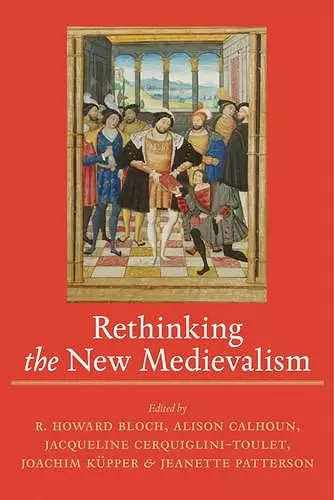Rethinking the New Medievalism
Joachim Küpper editor Alison Calhoun editor R Howard Bloch editor Jacqueline Cerquiglini-Toulet editor Jeanette Patterson editor
Format:Hardback
Publisher:Johns Hopkins University Press
Published:15th Apr '14
Currently unavailable, and unfortunately no date known when it will be back
This hardback is available in another edition too:
- Paperback£26.50(9781421412412)

Festschrifts are often marred by a lack of coherence or a retrospective, elegiac cast. By contrast, this volume coheres through its methodology and projects the need for future work. It is impressively wide-ranging in its language, culture, and topic. -- Sarah Spence, University of Georgia
Other contributors include Jack Abecassis, Marina Brownlee, Jacqueline Cerquiglini-Toulet, Andreas Kablitz, and Ursula Peters.In the early 1990s, Stephen Nichols introduced the term "new medievalism" to describe an alternative to the traditional philological approach to the study of the romantic texts in the medieval period. While the old approach focused on formal aspects of language, this new approach was historicist and moved beyond a narrow focus on language to examine the broader social and cultural contexts in which literary works were composed and disseminated. Within the field, this transformation of medieval studies was as important as the genetic revolution to the study of biology and has had an enormous influence on the study of medieval literature. Rethinking the New Medievalism offers both a historical account of the movement and its achievements while indicating - in Nichols' innovative spirit - still newer directions for medieval studies. The essays deal with questions of authorship, theology, and material philology and are written by members of a wide philological and critical circle that Nichols nourished for forty years. Daniel Heller-Roazen's essay, for example, demonstrates the conjunction of the old philology and the new. In a close examination of the history of the words used for maritime raiders from Ancient Greece to the present (pirate, plunderer, bandit), Roazen draws a fine line between lawlessness and lawfulness, between judicial action and war, between war and public policy. Other contributors include Jack Abecassis, Marina Brownlee, Jacqueline Cerquiglini-Toulet, Andreas Kablitz, and Ursula Peters.
The present volume in many ways celebrates and continues Nichols's ideas and influence in the past 25 years, but it does much more than that. As Bloch (French and Romance philology, Columbia Univ.) puts it in his introduction, the essays "contain many elements belonging to the New Philology-an attention to the material conditions of the medieval work, especially to the givens of manuscript culture, a questioning of authorship and authority, an interrogation of the integrity of medieval texts, recognition of the relation between the verbal and the visual."... Nichols's discussion of the challenges and opportunities for new philology in the digital age will be required reading in graduate seminars on digital humanities. Choice The essays ranged here by German and American scholars, in homage to Nichols and his cohort of new materialists, new philologists, new medievalists, are strong and ambitious attempts to revisit the twenty-year-old call for methodological reinvention. Common Knowledge
ISBN: 9781421412405
Dimensions: 229mm x 152mm x 24mm
Weight: 499g
288 pages